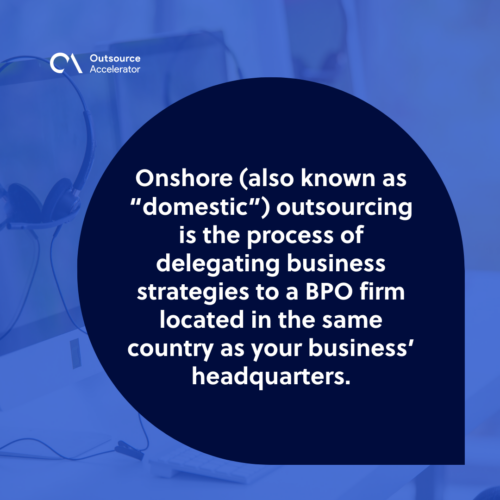Where to hire an outsourced staff

In the post-pandemic business world, more companies are looking to sustain their operations by saving on labor costs. This is where outsourcing comes into the picture. Outsourcing is the business practice of seeking the services of a Business Process Outsourcing (BPO) provider to perform certain functions of your company.
These external providers can be located all over the world. Businesses are given a good number of options on where to delegate and hire their outsourced staff.
Learning your outsourcing options
Generally, there are three main location options when it comes to outsourcing. You can choose amongst onshore (or domestic) outsourcing, nearshoring, or offshoring.
Onshore Outsourcing
Onshore (also known as “domestic”) outsourcing is the process of delegating business strategies to a BPO firm located in the same country as your business’ headquarters. This type is favorable for risk-averse companies – those who are just starting to dip their toes into outsourcing.
Some advantages of onshore outsourcing include:
- Similar time zones, culture, and native tongue;
- Similar labor laws and holidays;
- Close geographical proximity.
However, onshoring also has its disadvantages:
- Higher labor costs, especially when compared to the other two options;
- Lack of available talents.
- Close geographical proximity.
Onshore outsourcing is good if you’re only looking to hire a few outsourced staff. If you’re looking to delegate a bulk of your operations, then this is not a cost-effective option.

Nearshoring
Nearshoring is still a rising industry. It is the outsourcing of business processes to external providers located in a neighboring country. These external providers are near home, but not quite.
Some advantages of onshore outsourcing include:
- More affordable solutions than onshore outsourcing;
- Little to no time difference;
- Closer geographical proximity than offshore locations.
Choosing nearshoring has the following cons:
- Less number of skilled talents, especially when compared to offshore destinations;
- Partially-developed processes and workflows, since nearshoring is still a growing sector.
Nearshore companies can easily be visited, as they can be reached by land. It offers cheaper employment costs than onshore BPOs, but it can’t promise to cater to labor demand in bulk.
Offshore outsourcing
Offshore outsourcing is arguably the most common type of outsourcing. It is the process of delegating business functions to offshore BPO companies. These external providers are cost-effective, but site visits will require more money and effort.
Advantages of onshore outsourcing include:
- Up to 70% savings on employment costs;
- Wider range of talents;
- Tax benefits and strong government support;
- Fully developed processes and years of experience.
However, offshore outsourcing’s disadvantages include:
- Time zone adjustments;
- Potential hidden costs.
- Data privacy security risks
Offshore outsourcing offers cost-effective and flexible staffing solutions. Many BPO companies in the Philippines have been thriving for years, and they’ve mastered the skill or recruiting qualified and efficient employees.
Making the choice
Educating yourself is the first step towards making an informed decision. Next is to list all your company goals and priorities, then find out the method that is most aligned with your objectives.
Most BPOs offer free consultations and quotes. If you’re still undecided, you can reach out to some of them, then make your choice. Good luck!







 Independent
Independent




